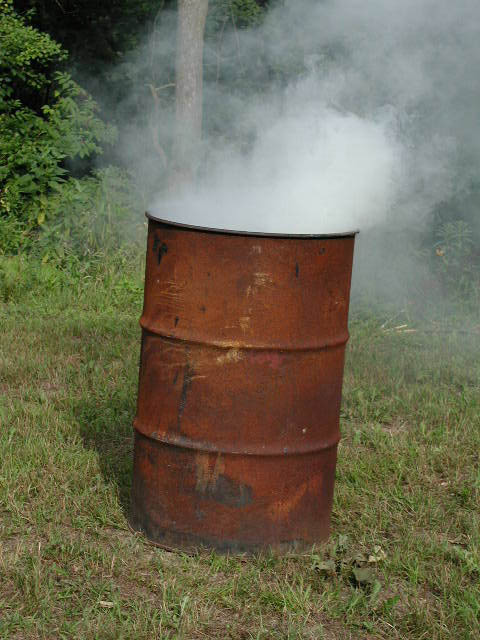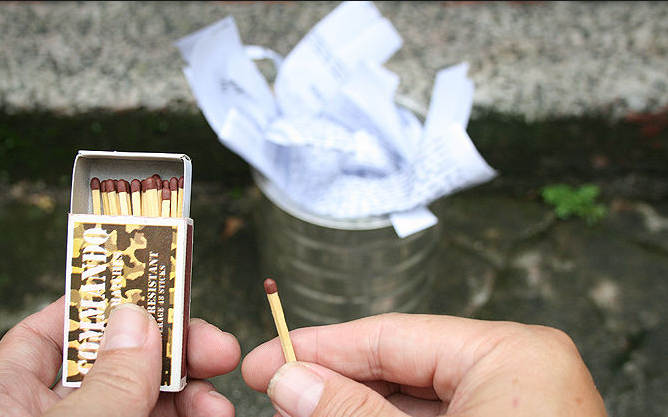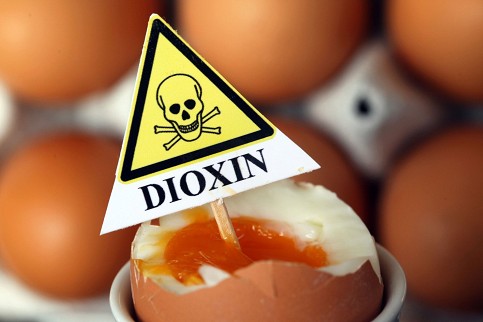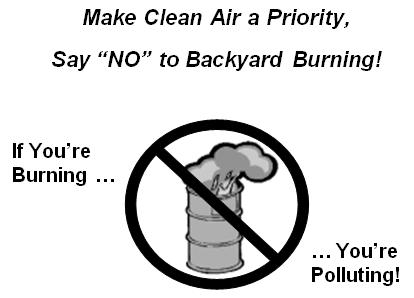Burning of waste ~ Not in my back yard!
The burning of waste is illegal and is subject to prosecution.
Burning of waste is not only a nuisance to neighbours; it can release many harmful chemicals into the air you breathe. Many people may think that they are doing the right thing in reducing the amount of waste going to landfill and saving money but they are both causing long term environmental pollution and interfering with the lives of others living in their area. Burning waste in your home or garden can damage your health, as well as that of your children and your neighbours. Such illegal practices lead to the release of toxic dioxins which are a real hazard for peoples’ health and the environment.

In September 2009, a law concerning waste disposal by burning came into force. These regulations make explicit the offence of disposal of waste by uncontrolled burning and prohibits such disposal within the curtilage of a dwelling. If reported, there is a hefty fine to be paid but the threat of this hasn’t stopped the back yard burning of waste which is still the norm in some households across the country. The term ‘backyard burning’ also refers to the burning of any waste in open fires, ranges and other solid fuel appliances or in the open. It includes the burning of green waste and also to the burning of waste on building sites.
Why is it still a common place sight around the country? – are people not aware of the risks to their health and the damage caused to the environment, is it to avoid paying for regular waste collection services, do they believe they are reducing waste or is it just too inconvenient to separate waste and reuse or recycle it? Years ago it was traditional to burn waste but today there is absolutely no excuse for it!
Stop before you strike that match!

Today, bleached paper, plastic packaging or plastic products, and printed materials with glues, plastic coatings and coloured inks make up a large portion of society’s waste. When these items are burned in low temperature fires like those that take place in a backyard burn barrel, very high levels of toxic chemicals and fine particulate matter are released with the smoke. Many of these toxins don’t readily break down, leading to accumulation and persistence in the environment.
What harm am I doing I hear you ask!
Backyard burning is far more harmful to our health than previously thought. The compounds in the smoke that comes from the burning can increase the risk of heart disease, aggravate respiratory ailments such as asthma and emphysema, and cause rashes, nausea, or headaches. Backyard burning also produces harmful quantities of dioxins, a group of highly toxic chemicals that settle on crops and in our waterways where they eventually wind up in our food and affect our health.

Sounds scary doesn’t it? Well it is! And you need to STOP!
Dioxins
Studies have shown that only small amounts of chlorinated materials in waste are required to support dioxin formation when burning waste. This means that even when materials containing high levels of chlorine, such as PVC, are removed from household waste, burning the waste still creates dioxins because nearly all household waste contains trace amounts of chlorine. Much of the dioxins created and released into the air through backyard burning settle on plants. These plants are, in turn, eaten by meat and dairy animals, which store the dioxins in their fatty tissue.
People are then exposed to dioxins primarily by eating the meat, fish, and dairy products, especially those high in fat. Backyard burning occurs most commonly in rural areas where dioxin emissions can more easily be deposited on animal feed crops and grazing lands. These dioxins then accumulate in the fats of dairy cows, beef, poultry, and pigs, making human consumption of these harmful chemicals is difficult to avoid.
Particle pollution
Microscopic particles with a diameter smaller than a human hair are released from back yard burning and pollute the air. Shutting the windows and doors of your home will not protect you from fine particle pollution because the particles are so small that they will infiltrate even the best quality double-paned windows and doors. These particles that are small enough to get into the lungs and can cause numerous health problems. Particles can aggravate respiratory conditions such as asthma and bronchitis, and have been associated with heartbeat irregularities and heart attacks. People with heart or lung disease, the elderly, and children are at highest risk from exposure to particles.

Carbon Monoxide
Another major pollutant generated by backyard burning is carbon monoxide. At low levels of exposure to Carbon Monoxide, humans may experience a variety of neurological symptoms including headache, fatigue, nausea, and vomiting. Carbon monoxide is a colorless, odorless gas emitted from combustion processes. At extremely high levels Carbon Monoxide can cause death!
Ash
Backyard burning also produces ash residue, which can contain toxic metals such as mercury, lead, chromium, and arsenic. These metals can be toxic when ingested. When a person ingests hazardous amounts of lead, for example, he or she may experience high blood pressure, cardiovascular problems, kidney damage, and brain damage. Unaware of the potential danger, some people scatter the ash in their gardens or bury it on their property. Garden vegetables can absorb and accumulate these metals, which can make them dangerous to eat. Children playing in the yard or garden can incidentally ingest soil containing these metals. Also, rain can wash the ash into groundwater and surface water, contaminating drinking water and food.
What are the alternatives I hear you ask?
Avoid making waste in the first place and you won’t have to worry about disposing of waste or recycling it later. Changing your habits is the key — think about ways you can reduce your waste when you shop, work and play. There’s a ton of ways for you to reduce waste, save yourself some time and money, and be good to the environment at the same time.

Follow these simple steps and STOP BACK YARD BURNING TODAY!
- DO NOT BURN WASTE.
- Avoid over packaged products and choose packaging that can be recycled
- Separate your waste and if you don’t have a recycle bin take recyclable waste to your nearest Civic Amenity Centres
- Compost Organic Waste
- Use only Properly Permitted and Regulated waste collectors and waste facilities.
Does back yard burning still take place in your locality? What steps do you take to reduce your waste both at home and in the workplace?
Some other great blog posts worth reading on this subject:
Should we be burning plastic – that’s the burning question?







